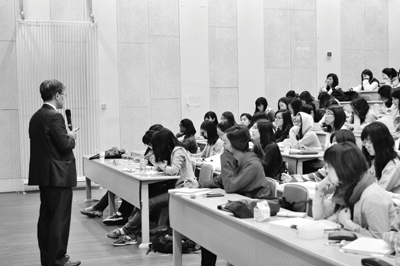
“Compared to students from other majors, EDIS students are more willing to participate in class,” professor Mah said. Also, it seems they have more diverse perspectives as they have lived abroad and experienced other cultures.”
Established in 2001, EDIS was the first in Korea to teach international studies at the undergraduate level. The EDIS provides interdisciplinary courses in English on politics, economics, business and law as they relate to global issues. The department was made to produce female talents with professional knowledge on both Korea and the international community and who can communicate with people from all around the world with proficient English.
The hidden efforts of professors were behind establishing EDIS.
“Making the curriculum of EDIS was difficult as we were the first,” professor Kim Eun-mee (International Studies) said. “But we could benchmark the Ewha Graduate School of International Studies, which has received the best evaluation from the government for its comprehensive achievement in having a full-time faculty, curriculum, careers of graduates and other standards.
“However, establishing a new major was difficult since the facilities and number of students assigned to other majors had to decrease. EDIS could be established because of the efforts of the former Ewha president, Jang Sang, and professor Yoo Jang-hee (International Studies) and professors from other majors’ understanding.”
Also, according to professor Kim, professors of EDIS wanted to select students with English proficiency and diverse backgrounds who were interested in working for the international community. The first EDIS students were selected based on their GPA and extracurricular activities in high school, an essay test and an interview both in English.
The first incoming class at EDIS numbered 31 students. Since they were the first, the relationship among students and professors was “tight”. However, there were also hardships that they had to go through.
“Being the very first members of EDIS was like a double-edged sword,” Lee Dong-eun (’01, International Studies) said. “While we enjoyed deep unity and a challenging spirit, we often went through ‘curriculum experiments’ that were not always successful. Also, not having seniors was difficult since we had to be starters in every aspect.”
In 2007, EDIS was placed under Scranton College, which was established in that year to enhance international and interdisciplinary education.
Currently, 403 students attend EDIS. Students have diverse opinions about the courses and EDIS itself.
“I like the diverse curriculum of EDIS,” Doh Ho-jeong (International Studies, 2) said. “Last year, I learned world history from an economic perspective, and this year, I am learning diplomacy from a Korean historical perspective. I think this is a true benefit in the 21st century where interdisciplinary study is a must.”
After graduation, more than half of EDIS graduates go abroad to continue studying in graduate schools in the fields of law, management, international relations and other areas. Some students get jobs at Korean conglomerates, multinational companies or investment banks.
“One of the unique characteristic of EDIS graduates is that the careers are diverse, like they learn different courses,” said professor Woo Won-seok (International Studies), the associate dean of EDIS. “There is even a student who produces English musicals for children.”
However, some students think the curriculum of diverse subjects could seem shallow.
“Learning several fields at the same time is sometimes not satisfactory when I want to have deeper understandings of certain fields,” Bae Jeong-eun (International Studies, 4) said. “Also, I think I should learn how to work with male students, whom I will face as I pursue my future career.”
To meet students’ demands to study certain fields in depth, EDIS runs a Concentration Program that certifies students who take 18 credits in one of three tracks: International Business and Economics, International Law and Diplomacy, and Asian Studies.
The school is also finding ways to meet student demands.
“We have been busy working for the diversity of EDIS,” professor Woo said. “Now, it is time for us to stabilize our curriculum and faculties by doing what we are doing hard. Also, we hope we could strengthen the ties between the graduates and the students.”
Yang Su-bin
subinyang@ewhain.net

